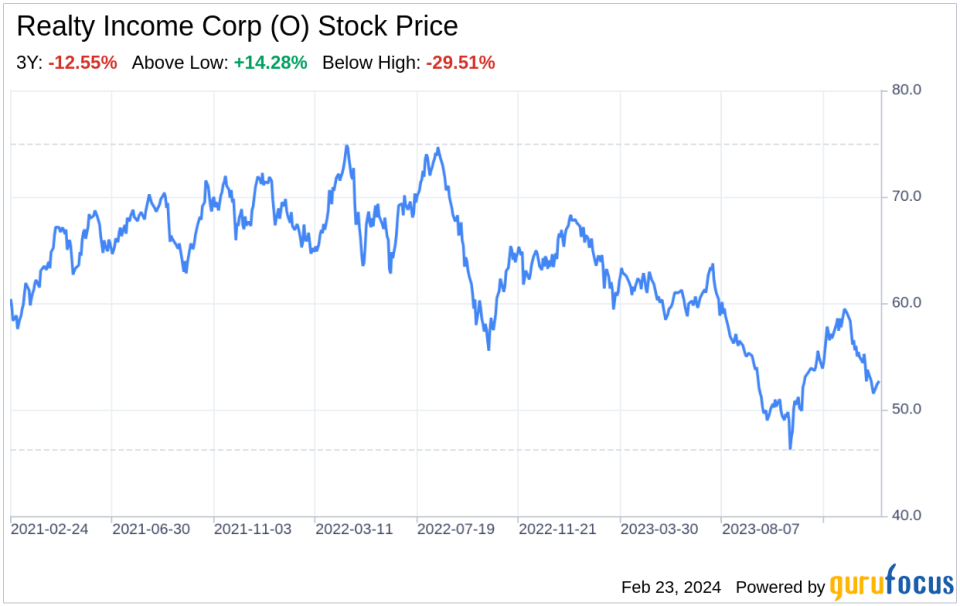Decoding Realty Income Corp (O): A Strategic SWOT Insight
Realty Income Corp's diversified portfolio spans across 50 U.S. states and Europe, with a focus on long-term net lease agreements.
Recent merger with Spirit Realty Capital, Inc. enhances property diversification and client relationships.
Investment strategy targets resilient retail clients and explores growth opportunities in Europe.
Active asset management and capital philosophy aim to deliver consistent earnings growth and dividend increases.
On February 21, 2024, Realty Income Corp (NYSE:O), an S&P 500 company and a member of the S&P 500 Dividend Aristocrats index, filed its annual 10-K report, revealing a robust financial position and strategic market presence. With a history of increasing dividends for over 25 years, Realty Income Corp owns or holds interests in 13,458 properties across the United States and Europe. The company's recent merger with Spirit Realty Capital, Inc. has expanded its portfolio, further diversifying its property and client base. Realty Income Corp's investment strategy focuses on acquiring properties essential to clients' operations, targeting retail clients with resilient business models. The company's asset management strategy aims to optimize returns and enhance credit quality, while its capital philosophy supports the goal of delivering dependable monthly dividends that increase over time.

Strengths
Diversified Property Portfolio: Realty Income Corp's expansive portfolio, which includes 13,458 properties across 50 U.S. states and Europe, is a testament to its strategic diversification. This geographic and industry-wide spread mitigates risks associated with market volatility and client concentration. The company's recent merger with Spirit Realty Capital, Inc. has further diversified its property types, adding industrial, office, and distribution properties to its traditionally retail-focused portfolio. This diversification is a significant strength, as it provides a stable income stream and reduces the impact of sector-specific downturns.
Consistent Dividend Growth: As a member of the S&P 500 Dividend Aristocrats index, Realty Income Corp has a proven track record of increasing dividends for over 25 consecutive years. This consistency is underpinned by the company's long-term net lease agreements, which ensure a predictable cash flow. The company's commitment to distributing at least 90% of its taxable income as dividends aligns with its REIT structure and is a compelling draw for income-focused investors.
Weaknesses
Exposure to Market Fluctuations: Despite the company's diversified portfolio, Realty Income Corp is not entirely insulated from the economic cycles that affect the real estate market. The company's performance is tied to the health of the retail sector, which is undergoing significant changes due to e-commerce and changing consumer behaviors. While the company has targeted clients resilient to e-commerce, any downturn in the retail sector could impact its rental income and, consequently, its ability to grow dividends.
Dependence on Capital Markets: Realty Income Corp's growth strategy involves acquiring high-quality real estate, which requires access to capital. The company relies on issuing common stock, preferred stock, and long-term unsecured notes to fund acquisitions. While this has been successful in the past, any adverse changes in the capital markets could hinder the company's ability to secure funding at favorable terms, potentially impacting growth and dividend payouts.
Opportunities
Expansion into European Markets: Realty Income Corp has identified Europe as a key area for growth, with investments in the U.K., France, Germany, Ireland, Italy, Portugal, and Spain. The company's strategy to build relationships with multinational clients in these regions presents an opportunity to tap into new markets and diversify income sources further. The expansion into Europe also allows the company to leverage its expertise in long-term net lease agreements in a new market context.
Adaptation to E-commerce and Omnichannel Strategies: The company's focus on clients with a strong omnichannel presence, which integrates brick-and-mortar with online retail, positions it to benefit from the evolving retail landscape. By targeting properties essential for last-mile delivery and customer experience, Realty Income Corp can capitalize on the growth of e-commerce and the continued relevance of physical retail locations.
Threats
Changes in Consumer Behavior: The shift towards online shopping poses a threat to traditional retail models, potentially impacting tenants' profitability and their ability to meet lease obligations. Realty Income Corp must continuously assess the resilience of its tenants to ensure the stability of its rental income. Any significant shift in consumer behavior that adversely affects its tenants could lead to increased vacancies or reduced rental rates.
Interest Rate Volatility: As a company that relies heavily on capital markets for funding, Realty Income Corp is susceptible to interest rate fluctuations. Rising interest rates could increase borrowing costs and reduce the spread between the company's cost of capital and investment returns. This could constrain the company's growth and affect its ability to maintain or increase dividend payouts.
In conclusion, Realty Income Corp (NYSE:O) exhibits a strong foundation with its diversified property portfolio and consistent dividend growth, which are central to its value proposition to investors. However, the company must navigate the challenges posed by market fluctuations and its dependence on capital markets. Opportunities for expansion into European markets and adaptation to e-commerce trends present avenues for growth, while threats from changing consumer behaviors and interest rate volatility require vigilant management. Overall, Realty Income Corp's strategic approach positions it well to capitalize on its strengths and opportunities while mitigating its weaknesses and threats.
This article, generated by GuruFocus, is designed to provide general insights and is not tailored financial advice. Our commentary is rooted in historical data and analyst projections, utilizing an impartial methodology, and is not intended to serve as specific investment guidance. It does not formulate a recommendation to purchase or divest any stock and does not consider individual investment objectives or financial circumstances. Our objective is to deliver long-term, fundamental data-driven analysis. Be aware that our analysis might not incorporate the most recent, price-sensitive company announcements or qualitative information. GuruFocus holds no position in the stocks mentioned herein.
This article first appeared on GuruFocus.
